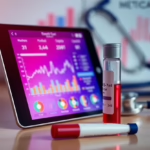Most of us know that staying on top of our health is important, but keeping track of when to get specific screenings can be overwhelming. As you age, your body undergoes various changes, and certain tests become vital for monitoring your health. In this blog post, I’ll guide you through the common health screenings you should consider at various stages of life, helping you make informed decisions about your health journey and understand what tests you need at each age milestone.
Key Takeaways:
- Regular health screenings should be tailored according to different age groups, with specific tests recommended for early detection of potential health issues.
- As individuals age, the frequency and types of screenings may change; for example, younger adults might focus on cholesterol and blood pressure, while older adults may also require screenings for cancer and diabetes.
- Staying informed about recommended screenings and discussing them with a healthcare provider can help ensure proper health management throughout life stages.
Health Screenings in Childhood
Before your child reaches adulthood, it’s important to implement a routine of health screenings to monitor their development and identify any potential issues early. Regular check-ups and tests during childhood not only ensure a healthy start but also lay a foundation for lifelong wellness.
Newborn Screenings
Across the nation, newborn screenings are performed shortly after birth to detect various health conditions. These tests typically include screenings for metabolic and genetic disorders, hearing tests, and pulse oximetry to check for heart defects. Early detection is vital, as it allows for prompt intervention and better outcomes for your baby.
Adolescent Health Checks
After your child enters their teenage years, health checks evolve to include assessments of physical, emotional, and mental health. These visits often involve discussions about lifestyle choices, such as diet, exercise, and substance use, as well as the importance of vaccinations that help prevent serious diseases.
Consequently, regular adolescent health checks can provide valuable support during this critical phase of development. I encourage you to initiate open conversations with your teen about their health, including mental wellness and personal safety. This approach not only fosters a sense of responsibility but also enables you to stay informed about any challenges they may be facing. It’s an opportunity for you to reinforce healthy habits that can last a lifetime.
Health Screenings in Young Adults
It is imperative for young adults, typically aged 18 to 29, to engage in regular health screenings. This stage of life often involves changes such as leaving home, starting college or careers, and managing new lifestyles. By staying proactive about health, you can catch potential issues early and establish a foundation for lifelong wellness.
Preventive Services for Ages 18-29
With a focus on preventive care, young adults should have a routine check-up at least every two years. During these visits, your healthcare provider can assess risk factors for conditions like hypertension, diabetes, and mental health concerns, encouraging healthy lifestyle choices tailored to your needs.
Important Vaccinations
Along with routine check-ups, vaccinations play a vital role in protecting young adults from various infectious diseases. It’s recommended to stay up-to-date on vaccines such as the flu shot, Tdap, and the HPV vaccine to prevent certain cancers and infections.
Consequently, ensuring you receive these important vaccinations can safeguard your health well into adulthood. Discuss with your healthcare provider about any required boosters, especially as you may be in environments such as college or workplaces where illnesses can spread more easily. Being proactive about vaccinations helps not just your health, but also protects those around you.

Health Screenings in Middle Age
All individuals in their middle age should prioritize regular health screenings to catch potential health issues early. This period, typically between the ages of 30 and 49, is vital for establishing a baseline of your health and addressing emerging concerns. These screenings help monitor chronic conditions, assess overall health, and inform necessary lifestyle adjustments for a healthier future.
Essential Tests for Ages 30-49
On reaching your 30s and 40s, I encourage you to schedule routine screenings such as blood pressure checks, cholesterol tests, and diabetes screenings, as well as regular dental and eye exams. These tests provide insights into your cardiovascular health and metabolic risks, allowing you to take proactive steps toward maintaining your well-being.
Cancer Screenings Recommendations
Among the various health concerns during your middle age, screenings for certain types of cancer become increasingly important. It’s advised that you discuss specific tests with your healthcare provider based on your personal and family history, as well as risk factors.
Further, depending on your gender and risk factors, I recommend starting screenings for breast, cervical, and colorectal cancers around this stage of life. For women, a clinical breast exam or mammogram may begin around age 40. Men should consider a discussion about prostate cancer screening with their doctors. It’s vital to have open conversations about your family history and lifestyle habits, as these can inform your screening schedule and help catch any issues early.
Health Screenings in Older Adults
Your health becomes even more important as you age, and regular screenings can help catch potential issues early. For older adults, screenings typically include assessments for blood pressure, cholesterol, diabetes, and certain cancers, such as colorectal and breast cancer. It’s important to stay updated with your healthcare provider to tailor your screenings to your personal health history and lifestyle. Staying proactive in your health management can significantly enhance your quality of life in your later years.
Key Assessments for Ages 50 and Up
For individuals aged 50 and older, key assessments include mammograms, colonoscopies, and screenings for hypertension and diabetes. Depending on your family history and other risk factors, your doctor might recommend additional screenings, such as prostate examinations or bone density tests. Staying informed about these assessments will empower you to make the best decisions for your health moving forward.
Managing Chronic Conditions
By managing chronic conditions effectively, you can improve your overall health and well-being as you age. Regular follow-ups and communication with your healthcare provider are vital to adjust treatment plans as needed.
With the right approach, managing chronic conditions like diabetes, hypertension, or arthritis can be integrated into your daily routine. This includes taking prescribed medications, following a balanced diet, engaging in regular physical activity, and attending routine check-ups. I have found that actively participating in my health management fosters a better understanding of my conditions and empowers me to make healthier lifestyle choices. You can take charge of your health too, leading to a more fulfilling life as you age.
Gender-Specific Screenings
For optimal health, it’s necessary to consider gender-specific screenings. Men and women have different health risks and conditions that require specialized attention. By staying informed about these screenings, you can take proactive steps toward maintaining your health as you age.
Women’s Health Screenings
An annual wellness exam is an excellent starting point for women, along with screenings for cervical and breast cancer. You should also consider a bone density test beginning at age 65, and if you’re at higher risk, even earlier. Staying proactive about these screenings can significantly improve health outcomes.
Men’s Health Screenings
In the context of screenings for men, you should start having regular blood pressure checks, cholesterol tests, and diabetes screenings. Prostate cancer screenings may also be appropriate, starting at age 50 or earlier if you have a family history. Taking control of your health starts with these important tests.
This focus on men’s health screenings is vital for early detection and prevention. I encourage you to prioritize assessments like the prostate-specific antigen (PSA) test and discuss your risk factors with your healthcare provider. Regular check-ups not only lead to better management of existing conditions but also help you stay informed about any potential health issues as you age.
Lifestyle Factors and Health Screenings
Not only do age and genetics play a role in when I should get health screenings, but my lifestyle choices also significantly influence my health. Understanding the impact of these choices can help me be proactive in my health journey. Here are some lifestyle factors that might affect my screenings:
- Physical activity level
- Diet and nutrition
- Smoking habits
- Alcohol consumption
This creates a comprehensive view of my health risks and screening needs.
Role of Diet and Exercise
To ensure I stay healthy and minimize the risk of disease, I must prioritize a balanced diet and regular exercise. Incorporating nutrient-rich foods alongside regular physical activity can significantly influence my overall health. These habits not only reduce the risk of chronic illnesses but also enhance my overall well-being, making screenings more effective and revealing.
Impact of Smoking and Alcohol
Smoking damages my health in numerous ways, increasing the risk of heart disease and cancer, while excessive alcohol consumption can lead to liver disease and other complications. These habits can also skew the results of certain health screenings, such as blood tests and imaging. Awareness of these dangers should motivate me to evaluate my behaviors and consider my screening schedules.
Lifestyle choices play a vital role in the effectiveness of health screenings. For instance, if I smoke or consume alcohol heavily, my risk factors can rise, potentially necessitating more frequent visits to healthcare providers. By making positive changes, I can improve my health outcomes, thereby ensuring that the tests I undergo yield the most meaningful insights into my well-being.
Final Words
Following this guide, I understand that health screenings are vital at every stage of life. It’s important for you to stay proactive about your health by knowing which tests to get and when. Each age group has specific recommendations, so staying informed can help you catch potential issues early. For more detailed insights on cancer screenings specifically, you can refer to the Cancer Screening Guidelines by Age. Prioritizing these screenings can lead to better health outcomes for you.



